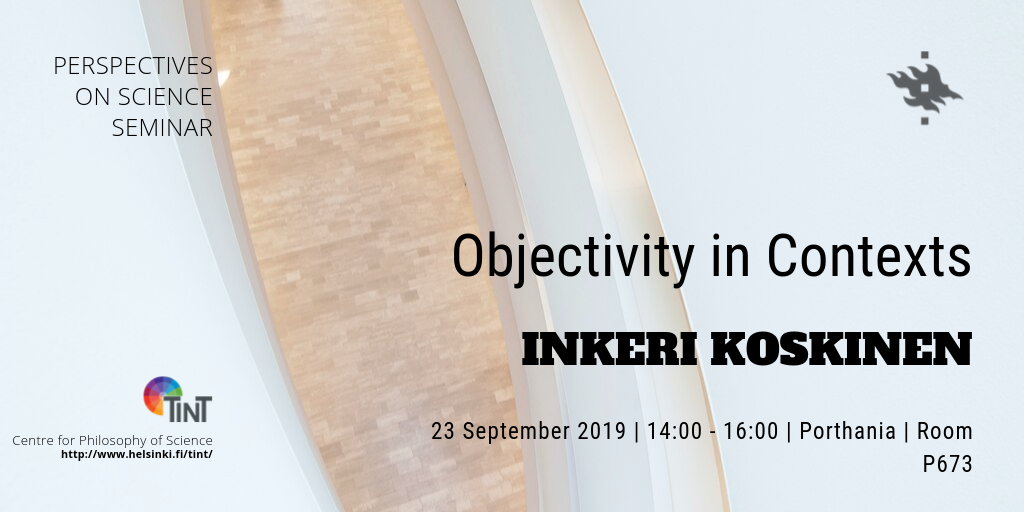At the next weeks Perspectives on Science -seminar (23.9.), Inkeri Koskinen (University of Tampere & TINT) will present her paper titled “Objectivity in Contexts”.
Perspectives on Science is a weekly research seminar which brings together experts from science studies and philosophy of science. It is organized by TINT, the Centre for Philosophy of Social Science at the University of Helsinki. More information about the seminar here.
The seminar will take place in Porthania, room P673, from 14 to 16.
Author bio:
Inkeri Koskinen is a university researcher at Tampere University and is affiliated with TINT. Her topics of interest are objectivity, diversity in science, values in science, democratisation of scientific knowledge production, transdisciplinarity and the philosophy of the humanities.
Paper abstract:
After Heather Douglas’s influential analysis (2004; 2009), many philosophers of science have agreed that instead of attempting to develop a coherent philosophical account of objectivity, we should either focus on distinguishing various distinct notions of scientific objectivity, or as Hacking (2015) suggests, renounce the whole notion. However, as I have recently argued (Koskinen forthcoming 2019), the diverse senses of objectivity recognised in the recent literature can be covered with a single, negative account: When we call X objective, we say that we rely on X, and that others should do so too, as important epistemic risks arising from our imperfections as epistemic agents have been effectively averted. All the positive senses of objectivity identify either some risk of this type, or some efficient strategy for averting one or more such risks. This “risk account” represents objectivity as a contextual matter: our diverse imperfections as epistemic agents lead to diverse epistemic risks, some of which become important in some contexts, and other ones in others. Moreover, also the risk mitigation strategies we use must vary according to context, as not all strategies are efficient everywhere. In this paper I focus on strategies developed in the humanities and qualitative social sciences, comparing them to strategies developed in the the natural sciences. As Daston and Galison (2007) note, objectivity has historically been strongly linked to the duty of scientists to avoid subjectivity. Strategies developed with this aim in mind typically screen out the subjective biases and idiosyncrasies of individual researchers. However, such strategies are not efficient against collective bias. I will argue the strategy of withholding epistemic judgement has been adopted in anthropology, sociology of science, and history of science in order to avert ethnocentrism, asymmetrical treatment of knowledge claims, and Whig historiography – all perceived as collective biases. This strategy reflects the importance of averting different types of collective bias in the humanities and qualitative social sciences. But the contextual nature of risk mitigation strategies means that a once satisfactory strategy can become unusable either when transferred to another context, or when the context changes. I examine arguments presented against the practice of withholding epistemic judgement in the light of the risk account of scientific objectivity.

